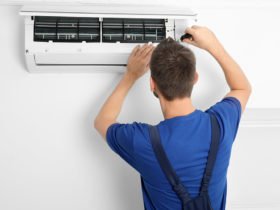Your health can be impacted by many things, including your indoor air quality. Just as outdoor air pollution can affect our skin, appearance, and health, indoor air quality can as well. The good news is that there’s something you can do about it. Though it may be difficult to mitigate the effects of outdoor air pollution, you can actually control your indoor air quality and take measurable steps to improve your health.
Watts Heating & Cooling has been helping customers just like you for years. We have the solution to get you breathing a little easier. But before we get to that, we want you to understand some of the common ways indoor air quality can impact your health.
1. Smoke
Like we said, your indoor air can become polluted just like your outside air. These pollutants can build up, causing you to have respiratory problems or other adverse health effects.
In fact, according to the Environmental Protection Agency, or EPA, Americans spend about 90 percent of their time indoors, where the concentration of pollutants is two to five times higher than what’s found in outside air.
Smoke is one of the common pollutants found inside homes. There are several contributing factors that can cause smoke buildup, such as cigarette smoke, chimney smoke, or smoke from a wood-burning stove.

Smoke can cause particulate matter to clog the airways and lungs. This impairs the body’s immune system and contributes to serious health conditions, such as chronic obstructive pulmonary disease as well as lung cancer.
2. Gases
Certain gases can also build up within your home. For instance, wood-burning stoves can lead to higher concentrations of carbon monoxide, an odorless and colorless gas. Some homes are heated with natural gas or use stoves powered by kerosene fuel, which can also lead to increased carbon monoxide levels. Malfunctioning HVAC equipment can be another culprit, which is why it’s so important to schedule regular maintenance appointments.
Though carbon monoxide can be fatal, there are things you can do to detect the deadly gas. Just like a smoke alarm, installing a carbon monoxide detector in your home can alert you when dangerous levels of the gas are present.
Similarly, carbon dioxide is an odorless, colorless gas that can be harmful in large quantities as well. Elevated levels can cause fatigue, headaches, and other symptoms. It can be produced by open flames or found in the soil under your home, as can radon.
Radon is a radioactive gas that is often found in the ground. Elevated levels of radon can cause lung cancer. If you’re a smoker who lives in a home with elevated radon levels, you’re at increased risk. To know whether radon poses a threat to your family’s health, it’s best to buy or request a radon test kit. Some state agencies mail these kits free of charge.
3. Chemicals
Common chemicals found in everyday household products can also compromise your indoor air quality. Lead, a chemical that was once frequently used in paints and is often found in older homes, can cause lead poisoning. If the paint in these older homes is disrupted by a renovation project, for instance, it could pose a serious risk to your health. That’s why it’s important that your home is properly ventilated so the polluted air can be removed and fresh air can be circulated back inside.

4. Mold
In addition to ventilation, it’s important to maintain your home’s humidity levels. A home that has too much moisture can become a breeding ground for mold.
Adverse health effects from mold vary greatly from one person to the next. Some people are unaffected by the presence of mold spores, whereas others can experience allergic reactions or respiratory problems. Some asthma sufferers may also experience exacerbated symptoms.
In order to prevent mold growth, you should consider buying a dehumidifier. A dehumidifier can remove excess moisture and humidity from the air. This will not only improve your comfort levels but may reduce your energy costs as well. Similarly, a humidifier can add moisture to the air if it’s too dry. For more information on the benefits of humidifiers, check out the infographic below.
Infographic Provided by American Residential Services
5. Dust and Dander
Your lifestyle can also impact your indoor air quality. For instance, if you have pets, the dander from your furry friends can clog your air filter. Likewise, when you go outdoors, you track dirt into your home, which can also cause your air filter to become clogged.
Once an air filter becomes clogged with dirt and debris, your HVAC equipment will operate less efficiently, and your indoor air quality will suffer as a result. Fortunately, there’s a simple fix. Changing your air filters regularly can take care of this common problem.

How to Improve Indoor Air Quality
As you can see, there are many ways indoor air quality can impact your health. The good news is that there are ways to mitigate these risk factors. It begins with investing in an efficient HVAC system, maintaining the unit, and making sure your home is properly sealed. Taking these steps won’t only have a positive impact on your health. They will increase your comfort levels and reduce your energy costs as well.
In addition to installing quality HVAC systems, Watts Heating & Cooling has many accessories available to help you breathe a little easier. If your home is prone to dirt or pet dander, we can outfit it with air filtration products that remove contaminants known to aggravate allergies. We also have ultraviolet lights that kill airborne microbial growth of mold, bacteria, and viruses.
Are you ready to improve your indoor air quality? If so, we offer free in-home consultations to diagnose problems and find the appropriate solutions. So give us a call to schedule an appointment. Not only can it be the first step toward improving your indoor air quality, but it may also be the first step toward improving your family’s health.


















